Date: 01/05/2019
Beatrice Tura is an SCDTP funded PhD candidate in the Department of Area Studies at the University of Portsmouth. Her PhD research focuses on Visual Representations of Minority Groups, Activism and the Everyday and she is particularly interested in how migrant ethnic minorities visualize place in an era of gentrification. She is currently in her first year of PhD studies, having completed a Master in Social Research Methods at Southampton University in September 2018.
The event Caribbean West London – comprising workshops, music performances and a photography exhibition – was held on the 31st of October 2018 (the last day of Black History Month). It was one of the results of my MSRM (Master in Social Research Methods) dissertation, entitled Caribbean Older People Negotiating Place in an Era of Gentrification.
It was held in a local international school which, for the occasion, in the evening opened its doors to the general public.
The objectives of the event were: augmenting exchange between academia and wider society, sharing complex concepts about long term residents of the area with a young audience, and finally, providing a space for research participants to share the experience of their involvement in the project and discuss issues they raised individually in a group.
During the day, different activities took place, which imparted knowledge on Caribbean cultural practices in west London to a young and varied community, aged 5 to 12. These included interactive Calypso music performances, carnival masks making and a workshop especially designed to explore the concepts of migration and diaspora – involving a large world map and felt-tip pens.
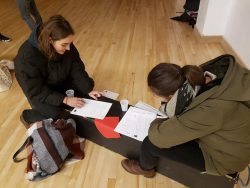
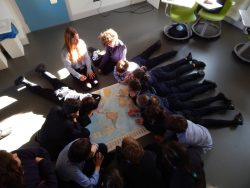
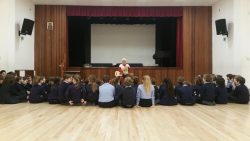
In the evening, research participants, members of the Caribbean community and beyond were invited to see a photography exhibition and a live Calypso performance by a local artist.
The exhibited images were products of the photo-elicitation endeavour undertaken by research participants as part of the project.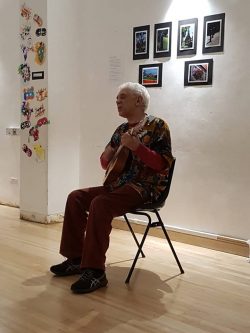
Photo-elicitation is a research method by which research participants are encouraged to take and share photographs pertinent to a research project. My project aimed at exploring traces of Caribbean settlement in certain areas of West London and, through photo-elicitation interviews, it found that ‘place’ is both made and negotiated through certain artistic and cultural practices.
Ladbroke Grove and Notting Hill, in the Royal Borough of Kensington and Chelsea, have been home to one of the largest Caribbean communities in London since the late 1950s and have a special symbolic significance for it. This is due to different reasons, including battles fought against racism there (riots in 1958, 1970 and 1976) and the famous Notting Hill carnival – a celebration of Caribbean unity and strength (Cohen 1993: 3).
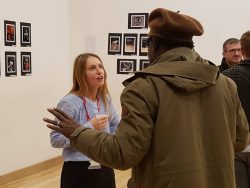 Caribbean creative practices and artistic forms, deployed in the area over the years, manifest individual and collective agencies that continue to fuel a politics of resistance and community consolidation. The exhibition, through the visual works of research participants, highlighted some of these practices and the sites in which they happen, with a focus on calypso music, carnival arts and individual photographic activities.
Caribbean creative practices and artistic forms, deployed in the area over the years, manifest individual and collective agencies that continue to fuel a politics of resistance and community consolidation. The exhibition, through the visual works of research participants, highlighted some of these practices and the sites in which they happen, with a focus on calypso music, carnival arts and individual photographic activities.